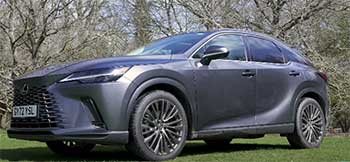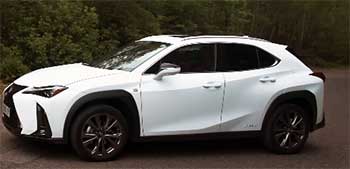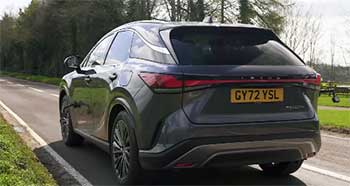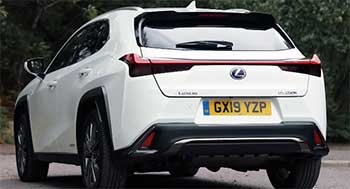When I set out to compare the Lexus RX and Lexus UX, my goal was simple: to help you decide which luxury SUV fits your lifestyle. As a car enthusiast who’s driven both, I’m breaking down their features, performance, and quirks to guide your choice. Whether you’re eyeing the midsize RX for its spacious luxury or the compact UX for its city-friendly efficiency, this article unpacks the pros, cons, and key differences in a conversational, real-world way. Let’s explore these two Lexus SUVs to find the one that’s right for you.
Comparison Table of Lexus RX vs. Lexus UX
| Feature | Lexus RX | Lexus UX |
| Type | Midsize SUV | Subcompact Crossover |
| Starting MSRP | $50,475 | $36,540 |
| Powertrain Options | Gas, Hybrid, Plug-in Hybrid | Hybrid Only |
| Engine | 2.4L Turbo I4, 3.5L V6, Hybrid | 2.0L Hybrid I4 |
| Horsepower | 275-366 hp | 196 hp |
| Fuel Economy (MPG) | 22/29 (Gas), 36/33 (Hybrid) | 43/41 (FWD), 42/41 (AWD) |
| Cargo Space (behind rear seats) | 29.6 cu ft | 17.1 cu ft |
| Passenger Space | 5 passengers (RX L variant up to 7) | 5 passengers |
| Length | 192.5 inches | 177 inches |
| Infotainment | 8-14 inch touchscreen | 8-10.3 inch touchscreen |
| Safety Features | Lexus Safety System+ 3.0 | Lexus Safety System+ 2.0/3.0 |
| Towing Capacity | Up to 3,500 lbs | Not rated for towing |
My Journey with Luxury SUVs
I’ve always been drawn to luxury SUVs for their blend of comfort, tech, and versatility. The Lexus lineup, in particular, has a knack for balancing elegance with practicality. This is why I’m comparing the RX and UX. These two vehicles represent different ends of the luxury SUV spectrum. The RX is a family-oriented midsize cruiser, while the UX is a nimble urban explorer.
My time behind the wheel of both, from city commutes to weekend getaways, gave me a clear sense of their strengths and trade-offs. Let’s break down what makes each one shine—and where they fall short.
Lexus RX Overview

The Lexus RX has been a staple in the luxury SUV world since the late 1990s, and it’s easy to see why.
As I slid into the driver’s seat of a 2023 RX 350, the first thing that struck me was the spacious cabin. It felt like a sanctuary, with soft leather seats and a 14-inch touchscreen dominating the dashboard.
The RX is a midsize SUV, stretching 192.5 inches long, which gives it a commanding presence on the road. It’s designed for families, long road trips, or anyone who craves a bit more room without jumping to a three-row beast like the Lexus TX.
The RX offers a range of powertrains, from a 2.4-liter turbocharged inline-4 (275 hp) to a hybrid system in the RX 450h+ (366 hp). I tested the RX 500h F Sport, and its 366 horsepower made merging onto highways a breeze. The ride was smooth, almost too smooth, leaning toward comfort over sportiness. It’s not a hot hatch, but it’s not trying to be. The RX also boasts towing capacity up to 3,500 pounds, which came in handy when I helped a friend move a small trailer.
Lexus UX Overview

The Lexus UX, on the other hand, is the baby of the Lexus SUV family. At 177 inches long, it’s a subcompact crossover that feels more like a raised hatchback.
I drove a 2025 UX 300h, and its compact size made parking in tight city spots a cinch. The UX is hybrid-only, powered by a 2.0-liter inline-4 hybrid engine that now delivers 196 horsepower—up from the previous 181 hp.
It’s not a speed demon, but the peppy acceleration surprised me during my urban test drives.
Inside, the UX feels premium but cozy. The 8-inch touchscreen (upgradable to 10.3 inches) is intuitive, and the cabin’s leather-trimmed steering wheel and power-adjustable seats added a touch of luxury. It’s built for solo drivers or small families who prioritize efficiency and maneuverability over cargo space or towing. With an EPA-estimated 43 MPG in the city, the UX was my go-to for zipping around town without frequent gas station stops.
Performance Comparison
Let’s talk about how these SUVs feel on the road. The RX, with its range of engines, offers more power and versatility. The 2.4-liter turbo in the RX 350 delivers 275 horsepower, while the RX 500h F Sport’s hybrid system pushes out 366 horsepower. I found the RX’s acceleration smooth and confident, especially on highways. The eight-speed automatic transmission shifts seamlessly, and the available all-wheel drive (AWD) gave me extra grip during a rainy test drive. However, the RX’s larger size and 4,300-pound curb weight make it less agile in tight spaces.
The UX, with its 196-horsepower hybrid, isn’t as powerful, but it’s no slouch. My test drive through downtown traffic showed off its nimble handling and tight 17.1-foot turning radius—perfect for city streets. The continuously variable transmission (CVT) felt smooth, though it lacked the punch of the RX’s eight-speed. The UX’s fuel economy (43 MPG city vs. the RX’s 22 MPG for gas models) was a game-changer for my daily commutes, saving me noticeable cash at the pump. But don’t expect to tow anything with the UX—it’s not rated for it.
Interior and Comfort
Stepping into the RX feels like entering a luxury lounge. The seats are plush, with eight-way power adjustments and optional ventilation. The rear seats offer ample legroom, and the RX L variant can seat up to seven, though the third row is best for kids. I loved the available 21-speaker Mark Levinson audio system—it turned my road trip playlists into a concert. The cargo space (29.6 cubic feet behind the rear seats) easily swallowed my camping gear, and folding the seats down opened up even more room.
The UX’s interior, while upscale, is more compact. The front seats are comfortable, but the rear is cramped for taller passengers. At 5’8”, I found the driver’s seat roomy, but a friend over 6 feet struggled in the back. The cargo area (17.1 cubic feet) was a letdown when I tried to load up for a weekend trip—my duffel bags barely fit. Still, the UX’s dual-zone climate control and available heated seats kept me cozy during chilly mornings. Both SUVs feature premium materials, but the RX feels more like a flagship, while the UX is a stylish starter.
Technology and Infotainment
Tech is where both SUVs shine, but they cater to different needs. The RX’s standard 8-inch touchscreen (upgradable to 14 inches) is crisp and responsive. During my test, Apple CarPlay and Android Auto worked flawlessly, and the available Lexus Enform system let me remotely start the car via an app. The RX also offers optional features like a panoramic view monitor and traffic jam assist, which made stop-and-go traffic less stressful.
The UX keeps up with an 8-inch touchscreen (up to 10.3 inches on higher trims). I appreciated the standard Apple CarPlay, Android Auto, and Alexa compatibility, which synced perfectly with my phone. However, the UX’s infotainment system felt slightly less polished than the RX’s, especially with the older console-mounted touchpad on some models. Both SUVs come with Lexus Safety System+ (2.0 or 3.0), including pre-collision detection, lane departure alerts, and adaptive cruise control. The RX edges out with extras like intuitive parking assist, which saved me during parallel parking.
Safety Features
Safety is a Lexus hallmark, and both the RX and UX deliver. The RX’s Lexus Safety System+ 3.0 includes pedestrian detection, lane tracing assist, and automatic high beams. I tested the adaptive cruise control on a highway drive, and it kept a steady pace even in heavy traffic. The optional panoramic view monitor was a lifesaver in crowded parking lots.
The UX’s Safety System+ (2.0 or 3.0, depending on the model) offers similar features, though it lacks some of the RX’s advanced options like traffic jam assist. During my city drives, the UX’s blind-spot monitoring and rear cross-traffic alert were reliable, giving me peace of mind in busy intersections. Both SUVs feel like fortresses, but the RX’s extra features give it a slight edge for long-distance drivers.
Pros of Lexus RX
- Spacious cabin with optional third-row seating.
- Powerful engine options, including a 366-hp hybrid.
- Generous cargo space (29.6 cu ft behind rear seats).
- Advanced safety features like traffic jam assist.
- Towing capacity up to 3,500 pounds.
Cons of Lexus RX
- Higher starting price ($50,475 vs. UX’s $36,540).
- Lower fuel economy (22/29 MPG for gas models).
- Less agile in tight city spaces.
- Some features (e.g., larger touchscreen) are optional.
Pros of Lexus UX
- Excellent fuel economy (43 MPG city).
- Compact size, ideal for urban driving.
- Affordable entry point ($36,540 MSRP).
- Nimble handling with a tight turning radius.
- Standard hybrid powertrain.
Cons of Lexus UX
- Limited cargo space (17.1 cu ft).
- Cramped rear seats for taller passengers.
- Less powerful (196 hp vs. RX’s 275-366 hp).
- No towing capability.
Pricing and Value
Price is a big factor when choosing between these SUVs. The RX starts at $50,475, reflecting its midsize status and robust features. Higher trims like the RX 500h F Sport can push past $60,000, but you get premium touches like rear-wheel steering and a 21-speaker audio system. I found the RX’s value strong for families or those needing extra space and power, especially with its hybrid options boosting efficiency to 36 MPG combined.
The UX, starting at $36,540, is the more budget-friendly choice. Its hybrid-only lineup keeps running costs low, and I noticed significant savings on fuel during my week-long test. However, the UX’s smaller size and limited cargo space make it less versatile. If you’re a solo driver or a couple in the city, the UX’s price and efficiency are hard to beat.
Discover More: Meguiars Hybrid Ceramic Wax reviews
Driving Experience

Driving the RX feels like gliding in a luxury liner. Its suspension soaks up bumps, and the cabin stays whisper-quiet, even at highway speeds.
I took it on a 200-mile road trip, and the comfortable seats and smooth ride made it a joy.
However, its size made navigating narrow streets a bit cumbersome.

The UX, by contrast, is a city dweller’s dream. Its compact dimensions and sharp steering let me weave through traffic with ease.
On a twisty backroad, the UX felt surprisingly sporty, though its 196 horsepower limited its punch.
The hybrid system’s seamless transitions between gas and electric power impressed me, but I missed the RX’s raw power on open roads.
Which One Suits You?
Choosing between the RX and UX depends on your lifestyle. If you need space, power, and towing capability, the RX is your pick. Its midsize footprint and versatile powertrains make it ideal for families or long-distance travelers. I’d recommend it for anyone who values luxury and roominess over fuel savings.
The UX, however, is perfect for urban drivers or those prioritizing efficiency. Its compact size and stellar MPG make it a practical choice for city life, but don’t expect it to handle big loads or long hauls. During my test drives, the UX felt like a stylish, efficient companion for daily errands.
Real-World Scenarios
Picture this: you’re a parent with two kids and a dog, planning a weekend camping trip. The RX’s cargo space and towing capacity make it the clear winner—you can haul gear and a small trailer without breaking a sweat. I loaded up the RX with tents and coolers, and there was still room to spare.
Now imagine you’re a single professional living downtown, navigating tight parking garages and heavy traffic. The UX’s compact size and fuel efficiency are lifesavers. I parked it in spots that would’ve been impossible for the RX, and the hybrid system kept my fuel costs low.
Considering Long-Term Value: Xpel Ceramic Coating
Frequently Asked Questions
No, the Lexus UX is smaller. The UX is 177 inches long, while the RX measures 192.5 inches, making the RX a midsize SUV and the UX a subcompact crossover.
The RX is a midsize SUV with more space and power, offering gas, hybrid, and plug-in hybrid options. The UX is a subcompact crossover, hybrid-only, with excellent fuel economy but less room. The NX is a compact SUV, sitting between the two in size, with gas, hybrid, and plug-in hybrid powertrains.
The UX shares some platform DNA with the Toyota RAV4 but is smaller, hybrid-only, and tuned for luxury with premium materials and a tighter turning radius. The RAV4 offers more cargo space and a broader range of powertrains.
Final Thoughts
As I reflect on my time with the Lexus RX and UX, I’m struck by how well they cater to different needs. The RX impressed me with its spaciousness and power, making it a fantastic choice for families or road-trippers. The UX, with its nimble handling and fuel efficiency, won me over for city driving. Your choice depends on what you value most—space and versatility or efficiency and maneuverability. Test drive both to see which one feels like home. I hope my experience helps you find the perfect Lexus SUV for your journey.

